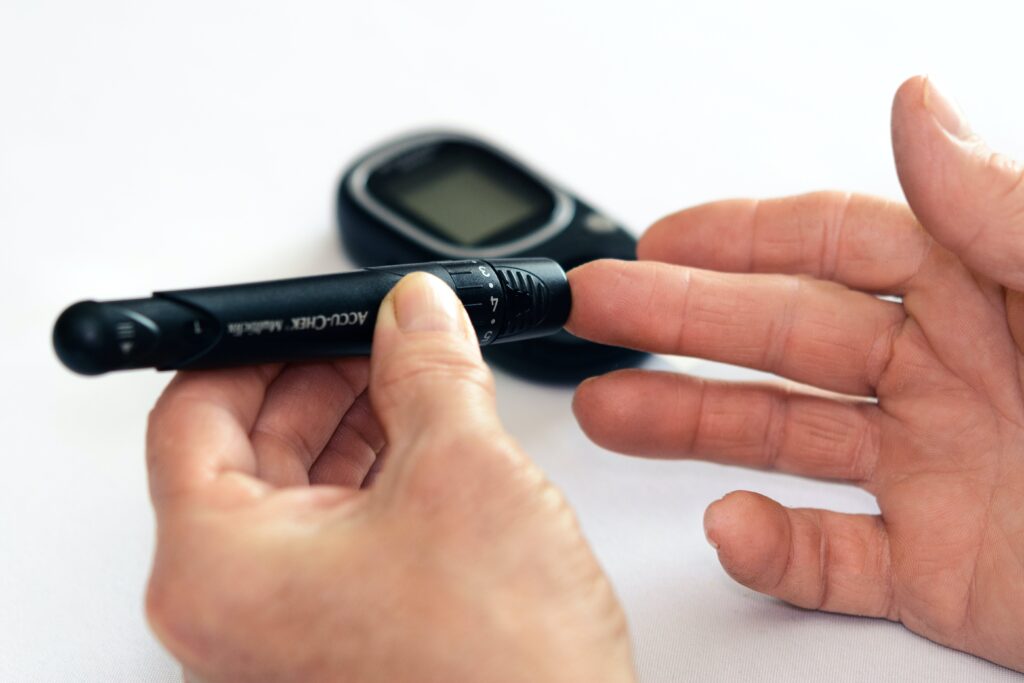
Diabetes
Type 2 Diabetes is a chronic condition where the body becomes resistant to insulin or doesn’t produce enough insulin, leading to high blood sugar levels. Insulin is a hormone that helps glucose enter cells for energy. Without proper insulin function, glucose builds up in the bloodstream, causing a range of health issues.
Type 1 Diabetes is an autoimmune condition where the body’s immune system attacks and destroys insulin-producing cells in the pancreas. Imagine your pancreas as a factory that normally produces insulin – in Type 1 diabetes, this factory completely shuts down. Without insulin, your body can’t convert sugar (glucose) into energy, causing blood sugar levels to rise dramatically. Unlike Type 2 diabetes, Type 1 is not caused by lifestyle factors and is not preventable. It’s typically diagnosed in children and young adults, though it can develop at any age.
Diabetes is like your body’s way of letting you know it’s having a hard time handling sugar the way it should. Usually, your pancreas makes a hormone called insulin, which helps sugar (from the food you eat) get into your cells to be used as energy. In diabetes, either your body doesn’t make enough insulin or it doesn’t use it properly, so sugar hangs out in your blood instead of getting to work. There are a few kinds of diabetes: Type 1, where the pancreas takes an early retirement and stops producing insulin, and Type 2, which is more like your body becoming stubborn and not responding to insulin the way it should. There’s also gestational diabetes, which sometimes pops up during pregnancy, and a few other rarer types.
Managing diabetes is all about teamwork with your body! Medications like insulin shots or pills might help, but a big part of it comes down to lifestyle changes. Think of it as treating yourself like a VIP: staying active, eating balanced meals (and yes, dessert can still make a guest appearance!), and keeping an eye on stress. For Type 1, insulin is non-negotiable, while Type 2 might respond to a mix of better habits and medication. Oh, and regular check-ups? They’re your body’s version of a spa day, making sure everything’s running smoothly. It’s not about perfection—just progress and paying attention to what makes you feel your best.
Type 2 Diabetes
Symptoms and Causes
Common symptoms include increased thirst, frequent urination, fatigue, blurry vision, slow-healing wounds, and unexplained weight loss. In some cases, symptoms may be mild or absent in the early stages. Type 2 diabetes is primarily caused by a combination of genetic and lifestyle factors. Obesity, a sedentary lifestyle, poor dietary habits, and a family history of diabetes are significant risk factors.
Prevalence and Prognosis
Over 37 million people in the United States have diabetes, with 90-95% of cases being type 2. Although it’s a lifelong condition, type 2 diabetes can often be managed effectively through lifestyle changes, medications, and regular monitoring.
Management and Treatment
- Diet: Focus on low-glycemic index foods, whole grains, lean proteins, and healthy fats.
- Exercise: Regular physical activity helps lower blood sugar levels and improve insulin sensitivity.
- Medications: Oral medications like metformin or injectable options may be prescribed.
- Monitoring: Regular blood sugar testing and check-ups help track progress.
Living with Type 2 Diabetes
Living with type 2 diabetes requires proactive self-care. Building a supportive network, learning about the condition, and adhering to a treatment plan can significantly improve quality of life. Advances in technology, like continuous glucose monitors (CGMs), offer additional tools for effective management.
Type 1 Diabetes
Symptoms and Causes
- Extreme thirst
- Frequent urination
- Unexpected weight loss
- Constant hunger
- Fatigue and weakness
- Blurry vision
- Mood changes
- Slow-healing wounds
Causes are primarily related to:
- Genetic predisposition
- Autoimmune response
- Potential environmental triggers
- Possibly viral infections
Think of your immune system like an overprotective security guard that mistakenly attacks its own building, in this case, the insulin-producing cells in the pancreas.
Prevalence and Prognosis
- Approximately 1.6 million Americans have Type 1 diabetes
- About 64,000 new cases diagnosed annually
- Typically diagnosed before age 20
- Requires lifelong insulin management
While it’s a serious condition, advances in medical technology have dramatically improved life expectancy and quality of life for people with Type 1 diabetes.
Management and Treatment
- Insulin Therapy: Daily insulin injections or insulin pump
- Blood Sugar Monitoring: Regular testing using glucose meters or continuous glucose monitors (CGMs)
- Diet Management: Balancing carbohydrate intake
- Regular Exercise: Helps manage blood sugar levels
- Annual Medical Check-ups: Monitoring for potential complications
Living with Type 1 Diabetes
- Developing a comprehensive care plan with healthcare providers
- Learning precise insulin dosing
- Understanding how food and exercise impact blood sugar
- Building a support network
- Using technology like CGMs and insulin pumps
- Maintaining a positive, proactive attitude
Coping Strategies
- Education is Key: Learn everything you can about the condition
- Stay Connected: Join support groups
- Be Prepared: Always carry emergency sugar and medical supplies
- Communicate: Keep friends and family informed about your management plan
Technological Advances
Modern management tools like smart insulin pumps, smartphone apps, and advanced CGMs have transformed diabetes care, making management more precise and less intrusive.
Featured in Diabetes
- Home Remedies to Tame Your Grumpy Joint
 Living with arthritis can sometimes feel like your joints have decided to throw a never-ending party—and not the fun kind.…
Living with arthritis can sometimes feel like your joints have decided to throw a never-ending party—and not the fun kind.… - Gut Feeling: Beating Malnutrition in Crohn’s One Bite at a Time
 Living with Crohn’s disease can sometimes feel like your digestive system is auditioning for a drama series, with its flares,…
Living with Crohn’s disease can sometimes feel like your digestive system is auditioning for a drama series, with its flares,… - Why Low-Calorie Diets Are Destroying Your Weight Loss Goals
 The weight loss industry has sold us a devastating lie: that severely restricting calories is the golden ticket to sustainable…
The weight loss industry has sold us a devastating lie: that severely restricting calories is the golden ticket to sustainable… - Sleep’s Shocking Impact on Insulin Regulation and Diabetes Management
 If you’re keeping an eye on your blood sugar, you probably focus on what you eat, how much you exercise,…
If you’re keeping an eye on your blood sugar, you probably focus on what you eat, how much you exercise,… - Insurers Want Biden-era Proposal Requiring Medicare to Cover Weight-loss Drugs Scrapped
 The world of healthcare and insurance is never short on drama, and the latest hot topic stirring the pot is…
The world of healthcare and insurance is never short on drama, and the latest hot topic stirring the pot is… - Eat Your Way to Happier Hips & Knees
 If you’re an arthritis warrior, you know that sometimes your joints feel like they’ve auditioned for a role as a…
If you’re an arthritis warrior, you know that sometimes your joints feel like they’ve auditioned for a role as a… - The Crohn’s Conundrum: Foods That Stir Up Trouble
 Ever feel like your stomach has a mind of its own? If you have Crohn’s disease, you probably know that…
Ever feel like your stomach has a mind of its own? If you have Crohn’s disease, you probably know that… - Healthy Meal Preparation: Sunday Success Strategy
 Sundays are often a bittersweet blend of relaxation and gearing up for the week ahead. While it’s tempting to sink…
Sundays are often a bittersweet blend of relaxation and gearing up for the week ahead. While it’s tempting to sink… - Metabolism Makeover: The Shocking Secret to Burning Fat Without Dieting
 Most weight loss articles promise quick fixes and miracle solutions. This isn’t one of them. Instead, we’re going to explore…
Most weight loss articles promise quick fixes and miracle solutions. This isn’t one of them. Instead, we’re going to explore…
Top Stories in Health
- Kidneys: The Unsung Heroes for Diabetics!Let’s talk about your kidneys—the tiny, bean-shaped superheroes working overtime to keep…
- Home Remedies to Tame Your Grumpy JointLiving with arthritis can sometimes feel like your joints have decided to…
- Breathe Easy: COPD Treatment Options ExplainedCOPD can make everyday life feel like you’re trying to suck air…
- A Digestible Holiday Feast That Won’t Ruin the Cheer!Ah, the holidays—a time for family, fun, and way too much food.…
- Avocado: Creamy Comfort for InflammationAvocados are the ultimate comfort food for anyone dealing with arthritis or…
- Leafy Greens for the WinSpinach, kale, and Swiss chard are the unsung heroes of the anti-inflammatory…

